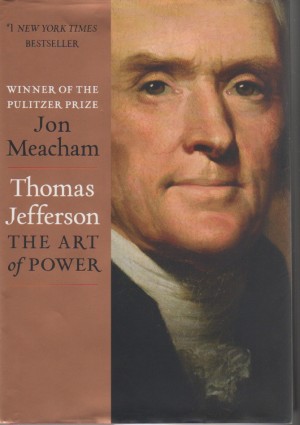Thomas Jefferson:The Art of Power by Jon Meacham (2012. Random House. ISBN 978-1-4000-6766-4)
Previously, I read (but didn’t review) Meacham’s book about Jefferson’s Republican idealogical successor, Andrew Jackson, American Lion, a book that had a limited scope in that the biography chronicled only Jackson’s time in the White House and gave scant background to the man’s roots, history, and ultimate end. I haven’t reviewed American Lion but if I had, despite the fact that it was well researched and written, I wouldn’t have rated it higher than 3 and 1/2 stars simply because of its abbreviated subject matter. Here, I am happy to say Meacham gives us the entirety of our nation’s third president. This is a complete, concise, and nicely crafted biography of one of America’s most beloved and misunderstood founding fathers. There is nothing left out, nothing missing from the life of Thomas Jefferson in this fine effort.
Meacham, a frequent guest on “Morning Joe” on MSNBC is a brilliant commentator on contemporary politics because he understands the undergirding of our two major political parties. In this volume, we learn of Jefferson’s love of republican democracy; the right of all landed, white males to determine their fate, and the fate of their newly formed nation, without interference from a monarch or a plutocracy of the rich. A rich man himself (at least until the end of his life when Jefferson died deeply in debt), Jefferson believed in the inherent wisdom of the common man (described, as above, as landed white men, a fairly exclusive definition of folks Jefferson trusted with the power of the ballot box) and one of his lasting legacies, beyond the Declaration of Independence, the Louisiana Purchase, and the Lewis and Clark expedition was the formation of the University of Virginia; a place where the common man would be able to enlighten himself and improve his understanding of nature, mathematics, science, the English language, and a host of other subjects dear to Jefferson’s heart.
Meacham paints a portrait of Thomas Jefferson that doesn’t shy away from the controversies that afflicted the man. Included in this narrative is a detailed account of Jefferson’s apparent cowardice during the Revolutionary War when, as the Governor of Virginia, Jefferson left Williamsburg (the colonial capital of Virginia at the time) as Tarelton and other British military commanders overran the colony. Jefferson was criticized throughout his life for leaving Williamsburg. Meacham examines the historical record regarding this incident, never passing judgment on either side of the question, allowing readers to form their own opinions on the issue. Similarly, the oft-told story of Sally Hemings, Jefferson’s mixed-race slave and alleged concubine is related in the same even-handed fashion. Meacham places Jefferson’s early opposition to slavery in the context of a southern slave owner. Despite this contradiction, the author points out that Jefferson apparently tried (on a number of occasions) to abolish the practice of slavery with the caveat that freed slaves would be sent back to Africa. Jefferson’s reform efforts failed and he gave up the notion, never releasing his own slaves from bondage during his lifetime with the exception of Sally Hemings’s offspring. Each of Sally’s children were emancipated, per his promise to Sally, on their 18th birthday. This demonstration of mercy, along with historical records, and modern DNA evidence leads Meacham to conclude that Thomas Jefferson was the likely father of all of Sally Hemings’s children. But the author also points out the inconsistency of Jefferson’s logic in that the plantation owner never released Sally from her obligations to him as a slave: It was Jefferson’s daughter, Martha, a niece of Sally Hemings, who finally freed the woman after Jefferson died at the age of 83.
Here is a full-throated, vibrant portrayal of one of America’s brightest political minds relayed to the reader with a firm eye towards fairness and accuracy. The writing is spot on. Meacham accurately describes the complexity of a man who has been quoted by American political figures as diverse as Ronald Reagan (who cited Jefferson’s love of a small central government to support his own programs) and Harry Truman (who claimed Jefferson’s views on domestic and international relations formed the basis for his own foreign and domestic policies). This is a book that every student of today’s fragmented political arena needs to read. The two-party system began with Thomas Jefferson and, despite some aspersions to the contrary, its effectiveness to govern has ebbed and flowed, sometimes working well, other times, as the present gridlock in Washington demonstrates, stalling ineffectively. Those readers tempted to decry the current political reality would do well to read this book. They will learn that, in all likelihood, “this too shall pass…”
4 and 1/2 stars out of 5.



